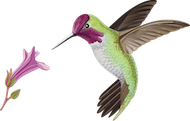The origin of mud
For most of Earth’s history, hardly any of the mucky stuff existed on land. It finally started piling up around 458 million years ago, changing life on the planet forever.
Inside the Weird Little World of Microclimates
If weather is your mood, climate is your personality. That’s an analogy some scientists use to help explain the difference between two words people often get mixed up.
The pandemic stilled human activity. What did this ‘anthropause’ mean for wildlife?
The study, which received funding from the National Science Foundation (NSF) this week, is just one example of how wildlife scientists are working to understand the impacts of what many are calling the “anthropause”—the dramatic slowdown in human activity caused by the pandemic.
What can we learn from wildlife sightings during the COVID‐19 global shutdown?
During the worldwide shutdown in response to the COVID‐19 pandemic, many reports emerged of urban wildlife sightings.
Birdwatching Is a Bright Spot in a Pandemic-Stricken Economy
Sales are through the roof for seed suppliers, birdhouse builders, and small businesses helping people connect with the nature in their backyards.
Ask Kenn Kaufman: Why Do Birds Abandon Nests for No Apparent Reason?
One of the pleasures of summer birding is the chance to observe nesting activities of various species.
Managing the Pests in Your Garden
Join Xerces’ Pesticide Program Director, Aimee Code and Pollinator Conservation Specialist, Emily May as they offer simple pest management tips for your garden.
In California, forest fires spark a babel of birdsong, study shows
In California, a group of researchers mapped the sounds of the hermit warbler (Setophaga occidentalis) and analyzed the impacts caused by forest fire on the birds’ songs.
Community science not yet enough for global bird counts
Community science may not yet be enough to help scientists determine bird population trends around the world.
Don’t Blame the Bats
In a new study, scientists assembled a dataset of the 142 known viruses that spill over from animals to humans and the species implicated as potential hosts.

